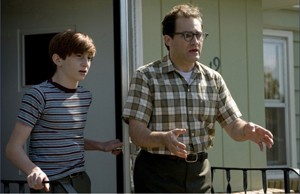Skipping A Beat: The Coen Brothers' A Serious Man
While many commentators have observed that the Coen Brothers’ latest offering A Serious Man marks a significant departure from the filmmakers’ previous work, a crucial aspect of its novelty has attracted little attention. Although the brothers made earlier pictures set in an overtly “historical” past, such as O Brother, Where Are Thou?, Barton Fink, Miller’s Crossing and The Hudsucker Proxy, this is their first serious attempt to render a world unfamiliar to cinéphiles. Whereas its predecessors concentrated on evoking the diffuse sense of an era by exaggerating Hollywood clichés, A Serious Man invites us to inhabit an under-represented perspective.
This may explain why the new film is so easy to date. Those earlier pictures were deliberately diffuse, evading real-world chronology in favor of a more abstract sense of period. Attempts to situate their storylines in relation to world-historical events seem forced, if not outright duplicitous. A Serious Man, by contrast, tenaciously insists on the specificity of its setting. From the Jefferson Airplane songs that recur throughout the diegesis to the richly elaborated interior and exterior mise-en-scène, we are constantly reminded that the story takes place on the cusp of the Summer of Love, that brief window of time in 1967 when people throughout the developed world were hipped to the notion that progress might not mean more of the same.
Larry Gopnik, the film’s eponymous protagonist, teaches physics at a university. At the beginning of the story, his future looks bright. With a wife, two children, a new car and a nice suburban home, he appears to have the middle-class American Dream firmly in his grasp. Although going through the stress of his tenure review, he does not anticipate any trouble surmounting that last hurdle. In short, his life seems to be “rock solid,” to deploy the phrase his lawyer uses later in the picture. It is an existence drained of risk, like wetlands that have been transformed into neat-and-tidy fields.
What he soon learns, however, is that a proverbial “bolt from the blue” can sever him from his existential foundation with stunning alacrity. The elaborate network of mental dikes and canals set up to manage trauma is overwhelmed by an existential deluge. While the Coen Brothers never invoke the story of Job directly, there is no doubt they want audiences to measure Gopnick’s misadventures by that depressing standard.
Mind you, there’s no evidence that this “serious man” has done anything to merit the tzuris – the word he chooses – that befalls him. When the chair of his tenure review leans into his office late in the film, just as Gopnick’s troubles have reached an unbearable level, our protagonist feels compelled to confess some wrongdoing. But the only misdeed he can come up with is having taken a single trip to see an arty erotic film from Sweden and, what is more, one that wasn’t even much of a turn-on for him.
Invoking Job raises questions about Hashem’s role in the narrative. Is Gopnick being deliberately tested? Or is his plight simply the result of accidents that only seem to be related? And to what extent can his troubles be attributed to the sweeping societal changes in which he is, like other middle-aged Americans of his era, inextricably caught up?
One of the film’s most important scenes shows Larry’s first attempt to get spiritual guidance. Although he wishes to get the perspective of the senior rabbi, imagining the man’s life experiences would be more germane to a discussion of marital troubles, he instead finds himself in conversation with the junior rabbi. There are hints that this amiable fellow is not interested in women. At the very least, he seems unfamiliar with how to deal with a mature heterosexual relationship. But the junior rabbi’s inability to provide concrete advice actually turns out to be a boon.
Inviting Gopnick to look through his louvered blinds at the parking lot beyond, this junior rabbi insists that it constitutes evidence that Hashem is not some watchmaker deity grown detached from his creation but an active presence in the world. “Look at the parking lot!” he urges Gopnick’s. From one perspective, this injunction seems like the height of absurdity. It is, after all, a medium-sized macadam parking lot, unremarkable in every way. But his enthusiastic insistence that even that drab gird is flush with G-d’s will resonates in a curious way with the drug-fueled illumination sought by members of the burgeoning counterculture.
The power of this scene lies in its clever presentation of detail. Although our attention, like Gopnick’s, is directed to what lies outside the window, the mundane reality we need to register is on the wall next to it. For hanging there in plain sight is a two-month calendar showing May and June of 1967. It is this detail that transforms the Jefferson Airplane’s music, which might otherwise have been taken as a general signifier of the counterculture, into another means of precisely dating the film’s narrative. Released as a single in April of that year, “Somebody To Love” began to climb the charts in May, pulling the band’s album Surrealistic Pillow along with it. By early June, both had reached the Top Ten on the Billboard charts.
That steady rise is directly proportional to Gopnick’s fall, suggesting that his tribulations are in some way tied to the ascendancy of the band’s sensibility. But this precise chronology also serves a more subtle and sophisticated purpose, one that reviews of A Serious Man have overlooked. While commentators on the film have mused on its hyperbolic Jewishness, noting that it contained far more autobiographical content than the Coen Brothers’ previous films, the historical significance for the Diaspora of the story’s time span has elicited no mainstream comment.
When the single “Somebody To Love” was peaking in early June of 1967, Jewish identity was being irrevocably altered by the events of the Six Day War. The scene in the junior rabbi’s office helps viewers make this connection by displaying a blue collection tin for donations to Israel on his desk, slightly out of focus but still easy to make out, and a map of the country on the wall next to the calendar. To be sure, these are entirely realistic props, the sort of details that flesh the mise-en-scène out to the filmmakers’ high standards. But in conjunction with the film’s precise dating they make it possible to discern a hidden meaning in its narrative.
The film opens with a strange allegorical scene – entirely in Yiddish, a language rarely spoken in American cinema – set in a shtetl within what was then Russia and is now Poland. A tradesman returns home to tell his wife he has met someone interesting on his trip back from the marketplace, a respected elder that she knows. When he names the man, however, she flips out, insisting that this gentleman died three years before of typus: her husband must have encountered a dybbuk. Just then, there’s a knock on the door – the husband has invited the man back for some soup – and the elderly traveler comes inside.
When the visitor refuses the soup, the wife takes it as proof that he really is a dybbuk – spirits don’t eat – and stabs him to prove her point. At first there’s no blood, leading her to adopt an I-told-you-so demeanor. But then we see the old man’s shirt begin to darken. Saying he does not feel well, he gets up and stumbles outside into the snow. The husband laments his ill fortune, while the wife, still apparently convinced that the visitor was already dead, tells him to relax. And then the scene fades to black, as the opening notes of “Somebody To Love” kick in.
Cleverly, the music leads us out of some indeterminate space up through the ear canal of Gopnick’s son Danny, who is listening to his transistor radio during his Hebrew lesson. None of the students in the class seem interested in the material they are studying, their bodies demonstratively resisting the imposition of tradition. And yet A Serious Man suggests that the very song with which Danny is attempting to drown out his heritage somehow represents a direct link to his ancestors, one that has magically bypassed the Holocaust.
Given the nature of that first scene in the shtetl, though, it might be more accurate to say that the song represents a direct link to literary ancestors. The dybbuk derives from a folk tradition at odds with the conventions of realism, one reworked in Yiddish literature from the tales of Rabbi Nachman through the work of Issac Bashevis Singer. Because “Somebody To Love” appeared on Surrealistic Pillow and is identified with the mainstreaming of psychedelia, it makes sense to regard the passage through Danny’s inner ear as an attempt to articulate connections between Jewish mysticism and the sort favored by the counterculture, both of them radically antithetical to the suburban lifestyle that Gopnick’s family is living at the start of the film.
But the shadow of that opening scene looms over the rest of A Serious Man in another, more complicated sense. By encouraging us to think of situations where we are confronted by ambiguous happenings that could be evidence of supernatural powers, it destabilizes even the most mundane details in the mise-en-scène. What initially looks like mere decoration, a way of reinforcing the impression of historical specificity that the film ably conveys, may turn out to be a portal to another reality.
That calendar and map on the wall of the junior rabbi’s office are a perfect example. Israel isn’t mentioned once in the film. Yet the temporal convergence of Jefferson Airplane’s success with that of the IDF in the Six Day War holds out the possibility that, just as the song links Danny to the shtetl, it also links him to the Golan Heights. The insouciance that he and his classmates demonstrate, their freedom from the backward-facing gravity of their parents’ generation, the confidence they demonstrate in resisting even religiously grounded authority – Danny gets high on the way to his Bar Mitzvah – is strangely in tune with Israel’s self-image after vanquishing its opponents in the conflict.
For Danny’s father, however, the “new freedoms” only seem to add to his insecurities. When his sexy new neighbor invites him inside to smoke marijuana – his wife has already exiled him to a motel at this point – they only end up discussing his visit to the junior rabbi. And the erotic dream he has about this woman, with her on top and Gopnick looking almost as if he’s in pain, only reinforces the point. His idea of relaxation is not sex, but lying down to listen to old Yiddish records. One of the film’s funniest scenes involves him talking to someone from the Columbia Record Club, for which Danny has signed up in his name. Gopnick keeps telling the representative that he didn’t do anything. The representative responds that doing nothing will result in being billed for the “selection of the month.” In other words, there’s a price for passivity. The tide of history must be actively resisted.
While the Coen Brothers’ ultimate intentions for A Serious Man are inscrutable, ending as it does on the verge of a personal apocalypse, there is no doubt that they want viewers to think hard about the relationship between timeless wisdom and the latest fashion. After the hilarious Bar Mitzvah scene, in which Danny muddles through the ritual reading in a bleary-eyed stupor while the congregation beams, then hears someone mutter “Jesus Christ!” after almost dropping the Torah, he is directed to visit the congregration’s spiritual leader Marshuk.
Earlier in the film, Danny’s father tries in vain, after being unsatisfied with the results of his visits to the junior and senior rabbis, to consult with this wizened oracle. He has been told that Marshuk only sees boys after their Bar Mitzvah now, a rumor that is confirmed when Danny stumbles into the room from which Gopnick is barred access. Does this constriction of access represent wisdom or an abdication of duty?
Danny’s brief visit with Marshuk can bolster both interpretations. The sage’s sole statement on this auspicious occasion – if you can even call it that – consists of him quoting the first lines of “Somebody To Love” and then reciting the names of four members of the Jefferson Airplane. He then hands over Danny’s transistor radio, confiscated at the beginning of the film, and smiles. Whether this exchange is meant to impart a serious lesson or simply reflects the degree to which youth and senescence mirror one another, it’s clear that it represents a passing of the torch, one that bypasses the anxieties of Gopnick’s generation, which came to political awareness during the Holocaust.
The American Jewish identity so vividly portrayed in the works of writers like Philip Roth, Bernard Malamud and Saul Bellow, whose male protagonists are refracted through Larry Gopnick’s character, is an identity that will ultimately prove sterile. Perhaps the murder of the purported dybbuk in the opening scene is a commentary on the mindset of a generation so preoccupied with death that it can’t discern the vitality of tradition. Or perhaps it’s simply a warning to us that, given the choice of seeing a parking lot as a mere parking lot or as the habitation of Hashem, we would be better off erring on the side of spirit.
Then again, the speed with which the Summer of Love and victory in the Six Day War gave way to seasons of discontent suggests that A Serious Man might be a cautionary tale of a different sort, one in which Gopnick’s earnest self-examination and moral gravity constitute crucial elements in a system of checks and balances. He may be the victim of his own boring goodness. But by putting himself in the line of fire, he may also be saving the lives of others. In light of the film’s abrupt ending, which shows both Gopnick and his son facing potential death – he with trepidation, Danny with awestruck calm – the meaning of this remarkable film must be sought in that realm where, as the words of “Somebody To Love” suggest, the distinction between truth and lies is uncertain at best.
![[the current issue of ZEEK]](../../image/2/100/0/5/uploads/leftistethicistgraphic-52842c6a.png)
- 5000 Pages of Zeek
- Founded in 2001, Zeek was the first Jewish online magazine, and we have over 5000 pages online to prove it, all available free of charge. Read more in the Archive.
More articles by
Charlie Bertsch
More articles in
Arts and Culture
- Euphoria, Curiosity, Exile & the Ongoing Journey of a Hasidic Rebel: A Q & A with Shulem Deen
- Poet Q, Poet A: Jews Are Funny! Six Poets on Jewish Humor, Poetry & Activism and Survival
- Tackling Hate Speech With Textiles: Robin Atlas in New York for Tu B’Shvat
- Fiction: Angels Out of America
- When Is an Acceptance Speech Really a Speech About Acceptance?






